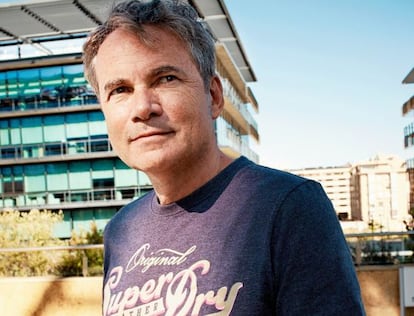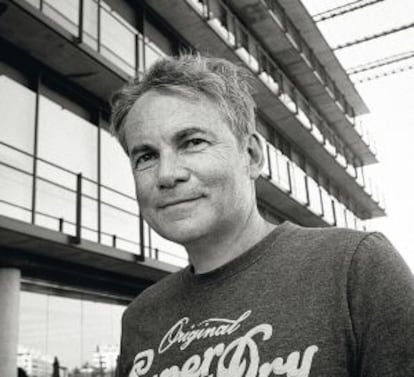“In Spain if things go well for you, half the population doesn’t like you”
Argentina-born tech entrepreneur Martín Varsavsky says his next project will “make people happy”

Argentinean by birth, Martín Varsavsky was educated in New York, and then moved to Spain in 1995, where he has set up seven companies, among them telecoms firm Jazztel, fiber optic network operator Viatel and internet portal Ya.com, as well as teaching entrepreneurship at Madrid’s IE Business School. His latest venture is Fon, which he describes as a “community-driven company dedicated to building the world’s largest global WiFi community through innovative user-generated infrastructure.” The project is backed by, among others, Google and Skype. Varsavsky is also one of Europe’s leading business angels, with investments in more than 20 companies, including Seesmic, Tumblr, Index Ventures, and Pixowl.
Married with six children, the 54-year-old says he has eased up his workload recently – “nobody tells themselves on their deathbed that they should have spent more time in the office” – and now leaves the office at 2pm. He spends his time between New York and Madrid, and in summer, much of it at his house in Menorca.
Question. You have founded seven companies over the last 20 years, but it hasn’t all been a bed of roses. In 1998 you were declared bankrupt after losing €35 million.
Answer. Yes, it was terrible. I should have sold Viatel, taken the money and focused on Jazztel, but I was too ambitious. I wanted to hold on to both companies, so I put my house up as collateral, and then the share price fell by more than 75 percent.
Bill Clinton is a much better leader than any that Spain has had”
Q. What happened?
A. My bank gave me a month to sort out the situation, and during that time the share price rose again. I was incredibly lucky, and from that point on I have never borrowed money.
Q. Where would you say that the technological revolution is leading us?
A. I have gone from being a techno-optimist in the 1980s to a techno-skeptic in the last decade, and back to being a techno-optimist again over the last seven years. These have been very fertile years. We are beginning to see the possibilities that biochemistry and silicon chemistry offer. We have the ability to make intelligent beings or intelligent things. In recent years we are seeing progress in the development of biochips: we could have living machines. There seem to be no limits to what we can do.
Q. For example?
A. We can program human beings. There are two approaches: programming things so that they behave like humans; and programming humans so that they perform better than computers. What has been achieved in the last five years is to reduce the size of a computer so that it fits into a ring, connecting it to a smartphone, which is connected to the cloud… I have been to conferences recently that make me think the future is going to be incredible: things that seemed like science fiction are going to be science reality. I have been in a driverless car, and it’s incredible. You just get in and say, “take me to this street” and then you get on with your work, and the car doesn’t run anybody down. We are going to see a transport revolution, in health, in energy. A lot of poverty on this planet is to do with energy: it’s what makes things expensive. Food is expensive because you need energy to cook. If we had free energy, we’d have free food. Our dependence on hydrocarbons has affected our societies and created enormous injustices. If we can reduce the cost of energy that would be a real revolution.
I have gone from being a techno-optimist to a techno-skeptic and back again”
Q. You mix with people like Mark Zuckerberg, Larry Page and Bill Clinton. Who has impressed you most?
A. Clinton. For me, a president needs to be a generalist, but I never met a generalist who knew so much about so many things. He knows a lot more than [Spanish Prime Minister Mariano] Rajoy. I have met Rajoy as well. I recently had dinner with [former Spanish Prime Minister José Luis Rodríguez] Zapatero and Clinton. He is a much better leader than any that Spain has had… He has the ability to learn and to reach conclusions quickly and to make fewer mistakes than others. Somebody else who impressed me when I met him was Amancio Ortega [found of the Inditex fashion empire], who has no business education and is 100 percent intuition. He is a genius, and a great person. It’s a shame he has to live in hiding. He has to live in hiding because the Spanish can’t stand success. They can’t stand the idea that somebody is successful. It is a very Spanish thing. If he were from Argentina, he would be a national hero, and if he were American, even more so. I wrote an article about the two types of entrepreneur: introverts and extroverts. Bill Gates is an extrovert, the type of person who succeeds by making alliances with others. Introverts, like Mark Zuckerberg and Larry Page, are poor communicators, but incredibly strategic. When I am with people like Larry Page and Eric Schmidt [co-founders of Google], who have invested in Fon, it’s clear that they are men of few words, but admirable because they absorb, listen, and reach conclusions. Larry Page lost his voice and couldn’t speak for six months. He can now speak with difficulty, but nobody understands what happened to him. I hope he gets better soon. But what a genius he must be to be able to continue running his company successfully!
Q. Have you experienced problems in Spain due to your success?
A. I didn’t grow up in Spain, and so I don’t care what people think about me. I don’t have to cultivate an image. I have my blog, my Twitter, my Facebook accounts, and people can form their own opinion of me. If they like me, fine. If not, so be it. I can understand. The thing about Spain is that if things go well for you, half the population doesn’t like you. The other half, who maybe have some aspirations, say: “Martín is an open-minded kind of guy, why don’t I learn from him?” I love living here. But entrepreneurs are more respected in Germany and Britain than here.
Q. You are critical of Spain…
A. There are people who don’t like it when you tell them what they need to do or how to do it. I am a Spanish citizen and pay my taxes here. I have 90,000 Twitter followers, and half of them are Spanish; and when they criticize me I hear about it. I am very proud of what I have done in Spain, of all the jobs I created. If you think what Spain used to be like, and what it is like now. I think I have done my bit by creating jobs in Jazztel, Fon, Eolia. When people criticize me I ask them what they have done for Spain. I have been paying my taxes and creating jobs since I moved here in 1995. That is my reply. I am critical because I have done things for this country and because I love this country and think that it deserves a better future.
Q. So you like living here, you feel at home?
A. I have a lot of great friends here, and I love the style of life when I am not working. I find myself representing Spain often because there are very few Spaniards who go to the places I go to, I don’t know why, well I do actually: they don’t speak English. Amancio Ortega is an incredible guy, but he doesn’t speak English; neither does Zapatero or Rajoy, or Aznar, although he learned a little. But it is shameful. Spain’s problem isn’t Catalan, Basque, or Galician, the problem is English. Let’s stop fighting over nonsense!
Q. A few years ago, Forbes magazine described you as one of the most brilliant minds in Europe, but Fortune criticized your financial management, accusing you of being a short-term thinker, and using junk bonds. When you read these things, what do you think?

A. I guess I must be a mix of the two. The media tend to extremes: everything is black and white. But nobody is like that. I have made mistakes. Fortune wrote that article when Jazztel was in crisis because they wouldn’t connect us. There are bad times when you can’t pay your debts and your share price drops, and people write bad stuff about you. But nobody can ever say that I did things badly or illegally. I did them better or worse, but within the law.
Q. What would you say are your faults?
A. I am very impatient. I am weak on information technology, because I have spent my career managing engineers. Sometimes I am insensitive to the difficulties involved in achieving what I ask. One of the reasons I leave the office early is so as not to hassle my employees, so that they can get on with doing what I asked them. I have to be careful not to freak people out; I don’t want them to end up hating me for giving them too much to do. On a personal level, it took me a long time to find happiness in marriage. I was married for two years, and then again for a year, and now I have been with Nina for seven years. It took me longer to find happiness in marriage than other people. I was too focused on my work, but I finally realized that having a family was very important. I would say I have been a better father than husband.
Q. At this point in your life, are there still things that you want to achieve?
A. I don’t have any political ambitions. In the end, what do I want to achieve? More of the same, to have ideas and to turn them into companies. I think that Fon is something that people want: to be connected at all times and wherever they are. I have another idea that I might put into practice when I finish with Fon. It’s called the baby insurance company. The current generation’s lifestyles are divorced from human biology, which means that two men, two women, or a woman aged 50 cannot have a child. Women are having children later and later in life, and this is a problem. But there are solutions, for example, having a baby with more than one other person by using donors: sperm, ovule, womb, and this would make a lot of people happy. It is what I have always wanted to do: a successful business that makes people happy.
Tu suscripción se está usando en otro dispositivo
¿Quieres añadir otro usuario a tu suscripción?
Si continúas leyendo en este dispositivo, no se podrá leer en el otro.
FlechaTu suscripción se está usando en otro dispositivo y solo puedes acceder a EL PAÍS desde un dispositivo a la vez.
Si quieres compartir tu cuenta, cambia tu suscripción a la modalidad Premium, así podrás añadir otro usuario. Cada uno accederá con su propia cuenta de email, lo que os permitirá personalizar vuestra experiencia en EL PAÍS.
¿Tienes una suscripción de empresa? Accede aquí para contratar más cuentas.
En el caso de no saber quién está usando tu cuenta, te recomendamos cambiar tu contraseña aquí.
Si decides continuar compartiendo tu cuenta, este mensaje se mostrará en tu dispositivo y en el de la otra persona que está usando tu cuenta de forma indefinida, afectando a tu experiencia de lectura. Puedes consultar aquí los términos y condiciones de la suscripción digital.









































